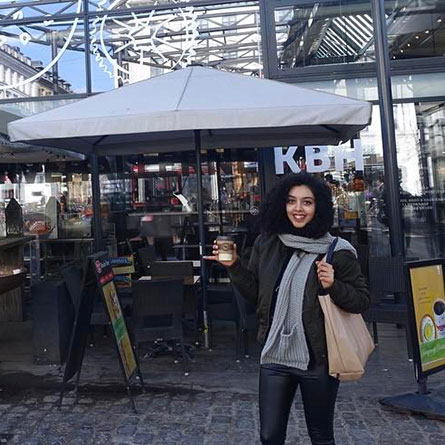
Rishma Mendhekar
Los Altos, California
Computer Science major, Art minor
We have strong faculty research programs that lay the foundation for diverse student-faculty research opportunities and advanced laboratory and field-based learning.
Timothy Becker’s research involves mining, modeling and transforming data into functional instruments. He develops open-source software that incorporates machine learning, generative modeling and visualization methods: https://github.com/timothyjamesbecker
He specializes in genomics but pursues other collaborative research in ecology, transportation and video/sound synthesis. He has many interdisciplinary collaborators, is open to new domains and partnerships and enjoys constructing interactive tutorials to encourage persistent learning. There is tremendous opportunity to make new and meaningful discoveries using an ever-expanding amount of data. Students that have interesting questions or a particular data source in mind should look at the faculty page for project ideas or inquire for more information: https://informatics.digital.conncoll.edu
Professor Chung’s research interests are in algorithm design and analysis. Specifically, she enjoys work in online and approximation algorithms, with a focus on matching, scheduling, routing, and Dial-a-Ride problems. She has also done research in algorithmic game theory, including work on inefficiency of equilibria, auction mechanisms, evolutionary game theory, and more recently, in social choice mechanisms (e.g., voting theory). For more details, see her home page.
James Lee’s research lies at the intersection of computer graphics, visualization, virtual environments, and interactive media arts. He explores how computation can shape creative expression and immersive experiences, often integrating real-time rendering, simulation, and artificial intelligence. His recent projects span embodied interaction, virtual human applications, and experimental game design. As a media artist with installations shown at venues including the Moss Arts Center and SIGGRAPH, Professor Lee also investigates how artistic practices inform computing research.
He regularly mentors undergraduates in research, including projects in visual computing, human-computer interaction, and data-driven storytelling. He welcomes students curious about combining technology and creativity, particularly those interested in exploring new interfaces, narrative forms, or machine-assisted media production. For more details, visit his research page: https://sjameslee.com/research/
The Douglass lab operates at the intersection of computer science, data science, and biology. Professor Douglass’ research primarily focuses on developing and applying methods for analyzing and interpreting genome-level biological data. His projects often relate to applications of next-generation sequencing technology, such as simultaneously measuring the usage of all of an organism’s genes or reconstructing previously undescribed genomes from DNA data derived from mixed populations of microbial organisms. Most of his recent work is in methods development, designing and publishing software tools to aid biologists in the analysis of their data. College-level biology knowledge is welcome but not necessary.
The central theme for research with Professor Parker is autonomous agent learning. The agents are robots, models of robots, and interactive video game players. The learning is usually a form of evolutionary computation and almost always some type of computational intelligence (evolutionary computation, neural networks, fuzzy logic). The agents are autonomous in the respect that they can operate on their own and the learning either takes place before operation or can happen during operation using learning systems that are often offline from the agent. Most of the learning is for control programs, although some is for the morphology of the robot or control/morphology in combination. In addition to this research, we also do robot development and learning for the play of board games. Although we have several projects in work, which you can see at https://cs.conncoll.edu/parker/Research.html and ../parker/papers.html, we're open to new proposals.
Primary research with Professor Tarimo involves the development of educational technologies (edTech) and the design & implementation of technology-supported teaching and learning practices. The current educational technologies are primarily developed as web-based applications. Research work involves designing and creating new web or mobile applications, adding new features to an existing application, and engaging with other professors and students. He also incorporates machine learning, data analytics, and visualizations as part of the research experiments on using and deploying the developed technologies and pedagogies.
New research continues to explore the use of wearable devices in edTech research, for example, using EEG data from brainwave-sensing headbands (Muse headbands) as a source of emotional and cognitive feedback during learning activities. This studies the connections between emitted brainwaves and different learning activities; and reuses the brainwaves data to give feedback to the learners and teachers, create visual art, etc. Additional opportunities for research and independent projects are on applied robotics.
Professor Izmirli's research interests are in the areas of computer audition and vision. More specifically, he continues to advise projects in audio-visual multimodal systems, motion analysis, generative systems, music information retrieval, digital signal processing for audio signals, optical music recognition, musical signal analysis and representation, music perception and cognition modeling, tonality tracing, expressive timing in music performance, computer-user interfaces for musical applications, and agent based systems modeling. You may reach out to discuss the scope of individual projects if you are interested in pursuing research in one or more of these areas.

Los Altos, California
Computer Science major, Art minor
Computer Science Department
Mailing Address
Department of Computer Science
Connecticut College
270 Mohegan Avenue
New London, CT 06320
Campus Location
New London Hall